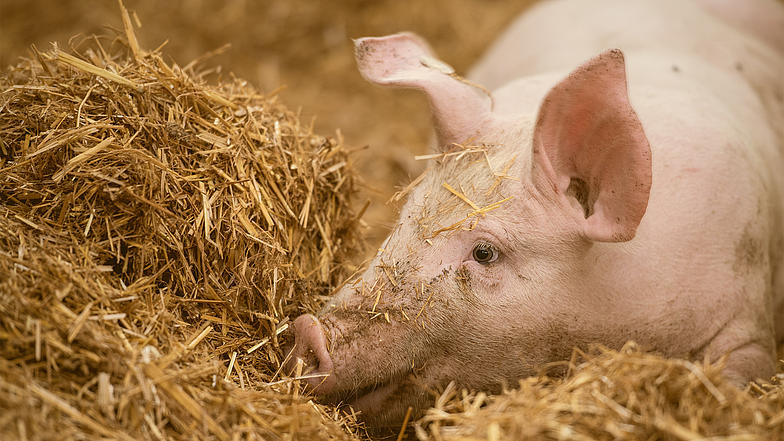foodwatch Report: Animals suffer just as much on organic farms
Millions of farm animals suffer massively from diseases, injuries and pain – regardless of whether they live on organic or conventional farms. foodwatch recently presented a plan for effectively turning the tide on the crisis of livestock farming.
Millions of farm animals suffer massively from diseases, injuries and pain – regardless of whether they live on organic or conventional farms. foodwatch recently presented a plan for effectively turning the tide on the crisis of livestock farming.
For its report “Animal suffering in the shopping basket” foodwatch analysed numerous veterinary studies from Germany and other European countries. The results are damning: In all types of animal husbandry, animals are suffering from severe production-related diseases.
One example: Nearly 40 per cent of all pigs in conventional housing systems were found to have serious health conditions, including pneumonia, open wounds and abscesses – this figure is only slightly better for animals on organic farms: 35 per cent.
Animal Husbandry Labelling (German: Tierhaltungskennzeichnung) is the planned mandatory labelling of the living conditions of livestock animals originating in Germany. The draft distinguishes the following five living conditions: organic, outdoor runs/free-range, indoor with fresh air, indoor with space and indoor housing.
Mastitis, abscesses and bone fractures
The situation is similar for other farm animals: Up to 39 per cent of dairy cows suffer from painful hoof diseases. On one organic dairy farm, mastitis (infection of the udders) was found in one out of every two cows. Up to 97 per cent of laying hens suffer from bone fractures – both in conventional cages and organic systems.
Nevertheless, massive quantities of the eggs, milk and meat from these diseased animals end up on supermarket shelves with no labelling system to inform consumers about the health of the animals that supplied them.
Animal health is the most important factor, not housing conditions. A lame cow cannot benefit much from a meadow.
Housing systems not a determining factor for health
To date, the public debate surrounding improved farm animal welfare in Germany has been focused solely on new labelling schemes or the renovation of farm buildings. However, studies clearly show that diseased and injured animals are nearly as prevalent on small organic farms as they are on large factory farms. The health of chickens, pigs and cows depends not only on how much larger the stalls are or whether there’s straw on the ground, but also to a large extent on the farm management practices – meaning how well, or poorly, the farmers run their operations.
Livestock farming is highly complex and presents major challenges for farmers. While some farms manage to achieve consistently high levels of animal health, others experience ongoing problems with diseased and injured animals.
The discourse surrounding animal health is reminiscent of the climate crisis debate: Although the scientific evidence could not be clearer, policymakers are looking the other way.Research and Campaigns in foodwatch Germany
foodwatch guide for improving the health of farm animals
To date, there has never been a single law requiring livestock farmers – be it organic or conventional – to keep their animals healthy. This situation must change. foodwatch has presented a guide that explains how a system that promotes animal health can be successfully implemented.
- Data on the health status of farm animals must be systematically collected for every farm. For this purpose, it would also be possible to use data that is already being collected, for example at slaughterhouses.
- Furthermore, a health index should be introduced using the data collected from all farms. This index would make it possible to compare various results: Which farms are performing well? Which farms are having ongoing problems with diseased animals?
- Farms with poor animal health would have to be offered guidance and required to make the necessary improvements. In addition, farms whose poor results do not improve should face consequences, such as the reduction of agricultural subsidies or, as a last resort, being banned from keeping livestock. At the same time, there should also be a system for rewarding farms that perform well. For example, dairies and slaughterhouses could pay them higher prices for their products.
